Suchergebnisse
GreenTech-Renovation - Energetic Renovation of Glass Buildings of Architectural Value
The focus of the GreenTech-Renovation project was to find innovative solutions for the energetic renovation of architecturally valuable buildings with a high proportion of glass. A future-oriented building physics concept that includes the use of alternative forms of energy had been developed for this purpose. With ecological and social commitment, an intelligent usage concept could strengthen the energetic renovation concepts and guarantee their sustainability. The 10-Rs of the circular economy (Refuse, Rethink, Reduce, Reuse, Repair, Refurbish, Remanufacture, Repurpose, Recycle, Recover) will serve as a guideline.
VERTICALurbanFACTORY: Innovative Konzepte der vertikalen Verdichtung von Produktion und Stadt
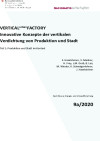
Das Projekt beforscht Möglichkeiten und Potenziale hocheffizienter Raumnutzung durch moderne Konzepte „gestapelter“ Funktionen und vertikaler Produktion.
Schriftenreihe
9/2020
E. Haselsteiner, V. Madner, H. Frey, L.M. Grob, B. Laa, M. Winder, K. Schwaigerlehner, J. Haselsteiner
Herausgeber: BMK
Deutsch, 253, 153 bzw. 52 Seiten
Downloads zur Publikation
Richt- und Zielwerte für Siedlungen zur integralen Bewertung der Klimaverträglichkeit von Gebäuden und Mobilitätsinfrastruktur in Neubausiedlungen
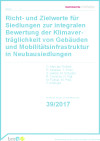
Entwicklung und Abstimmung von Kennwerten für die energetische und ökologische Bewertung von Siedlungen auf Basis der Schweizer 2000-Watt-Arealzertifizierung. Die Ergebnisse bilden einen weiteren Baustein zum Aufbau eines Qualitätssicherungssystems für Siedlungen ähnlich der klimaaktiv Deklaration für Gebäude bzw. der e5 Zertifizierung für Gemeinden.
Schriftenreihe
39/2017
Herausgeber: BMVIT
Deutsch, 118 Seiten
Downloads zur Publikation
LehB:klimafit! Live in existing buildings today: climate fit together
The aim of the project is to explore transferable renovation concepts for the implementation of climate-fit renovations in Vienna. Integrally optimized renovation packages will be developed, which will be optimized in the building ensembles for implementation-probable, climate-friendly overall solutions with the relevant stakeholders.
Die CO2 neutrale Baustelle - Ein Beitrag zum Klimaschutz der österreichischen Bauwirtschaft
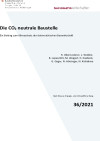
Identifikation aller auf Baustellen anfallenden direkten und indirekten CO2- bzw. THG-Emissionen. Analyse der Rahmenbedingungen und Technologien, um Möglichkeiten für deren Steuerung aufzuzeigen. Gleichzeitig wurden Mehrwerte wie beispielsweise Kosten- und Nutzen-Vorteile einer CO2-neutralen Baustelle aufgezeigt und quantifiziert.
Schriftenreihe
36/2021
R. Obernosterer, L. Winkler, B. Lepuschitz, M. Weigert, H. Daxbeck, G. Goger, N. Hörzinger, N. Kisliakova
Herausgeber: BMK
Deutsch, 119 Seiten
Downloads zur Publikation
Energiespeicher Beton: Thermische Bauteilaktivierung. Planungsleitfaden Einfamilien- und Reihenhäuser
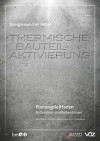
Im Planungsleitfaden "Heizen und Kühlen mit Beton" werden die Erkenntnisse bisheriger Forschungsprojekte zur Bauteilaktivierung zusammengefasst, es wird gezeigt, wie Energie in massiven Bauteilen über längere Zeit gespeichert und zu beliebigen Zeitpunkten wieder abgerufen werden kann. Der Planungsleitfaden ist mit detaillierten Anleitungen auf die Bedürfnisse von Planenden und Bauausführenden sowie auf die Wissensvermittlung zur Aus- und Weiterbildung konzipiert.
Felix Friembichler, Simon Handler, Klaus Krec, Harald Kuster
Herausgeber: BMVIT
Deutsch, 122 Seiten
Downloads zur Publikation
PhaseOut - Wärmepumpentechnologien in der Bestandssanierung
Ziel ist die Konzeption, Optimierung, Umsetzung, Demonstration und Bewertung von innovativen, minimalinvasiven Sanierungslösungen (thermische Sanierung und Heizungstausch) mit Wärmepumpen und PV im Geschoßwohnbau an sieben baugleichen Gebäuden. Es erfolgt ein umfänglicher Vergleich verschiedener technischer Lösungsvarianten auf Basis modularer und skalierbarer Gebäudetechniksysteme sowie multifunktionaler Gebäudekomponenten für den Austausch von dezentralen Gasetagenheizungen durch zentrale, semi-zentrale und dezentrale Wärmepumpen-Lösungen.
HEROES - Häuser für Energie und RessOurcenEffiziente Siedlungen
Ein vereinfachtes Verfahren für die Berechnung von ökologischen Kennzahlen für bisher nicht betrachtete Gebäudeteile (thermisch nicht relevante Bauteile und Haustechnikkomponenten) wird entwickelt. Die methodischen Grundlagen für die Berechnung der Primärenergie u. der CO2-Emissionen im Betrieb und in den verbauten Materialien werden harmonisiert.
Programmmanagement und Kommunikation in der missionsorientierten Forschungsförderung
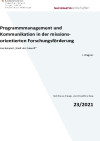
Diese Studie stellt sich die Frage, wie Programmmanagement und Wissenskommunikation in der missionsorientierten, angewandten Forschung konzipiert und effektiv umgesetzt werden können. Mittels Literatur- und Dokumentenanalyse, Stakeholderanalyse, internationaler Fallstudien, Interviews, Fokusgruppen sowie einem Co-Creationworkshop wurden Rückschlüsse auf die aktuelle Wirkung der Kommunikationsdimensionen des Programmes "Stadt der Zukunft" gezogen und Überlegungen hinsichtlich der Weiterentwicklungsmöglichkeiten zu Missionsorientierung nach OECD-Definition angestellt. Das resultierende Modell wurde in einem finalen Reflexionsworkshop mit dem Auftraggeber diskutiert.
Schriftenreihe
23/2021
I. Wagner
Herausgeber: BMK
Deutsch, 92 Seiten
Downloads zur Publikation
E_PROFIL - Quartiersprofile für optimierte energietechnische Transformationsprozesse
Mit E_PROFIL, als Methodenset zur Erstellung von Quartiersprofilen, wird ein wichtiger EDV-gestützter Werkzeugkasten geschaffen, der in der Planungspraxis österreichischer Städte zur Anwendung kommen wird, um eine energie- und ressourceneffiziente Stadtentwicklung zu unterstützen. Er ist ein wertvolles Asset für die Forschungs- und Planungsaktivitäten in Siedlungsverbänden.
PhaseOut – Heat pump technologies in the renovation of existing buildings
The aim is the conception, optimization, implementation, demonstration and evaluation of innovative, minimally invasive renovation solutions (thermal renovation and heating system replacement) with heat pumps and PV in multi-storey buildings on seven identical buildings. The comprehensive comparison includes various technical solution variants based on modular and scalable building technology systems as well as multifunctional building components for the exchange of decentralized gas heating by central, semi-central and decentralized heat pump solutions.
AR-HES-B – Abwasserreinigung zur hybriden Energiespeicherung, Energiebereitstellung und Wertstoffgewinnung
AR-HES-B verfolgt das übergeordnete Ziel, technologische Änderungen der kommunalen Abwasserreinigung zu entwickeln, um die Abwasserreinigung vom Energieverbraucher hin zum hybriden Energieerzeuger und Energiespeicher und als Wertstoffbereitsteller zu erreichen. Durch das AR-HES-B Konzept positioniert sich die städtische Abwasseraufbereitung als eine wichtige Drehscheibe im überregionalen Energie- und Stoffaustausch.
Urban Area Parameter – Kennwerte Siedlungsbewertung für Errichtung, Betrieb und Mobilität in klimaverträglichen Siedlungen
Entwicklung und Abstimmung von Kennwerten für die energetische und ökologische Bewertung von Siedlungen auf Basis der Schweizer 2000-Watt-Arealzertifizierung. Die Ergebnisse bilden einen weiteren Baustein zum Aufbau eines Qualitätssicherungssystems für Siedlungen ähnlich der klimaaktiv Deklaration für Gebäude bzw. der e5 Zertifizierung für Gemeinden.
ProzesSan - Prozessinnovationen zur Erhöhung der Dekarbonisierungs- & Sanierungsrate im Wohnbau
Das Projekt soll die Gebäudeeigentümer:innen großer Immobilienbestände bei den Herausforderungen in Bezug auf die Sanierung ihrer Gebäudebestände unterstützen. Zu Beginn werden die verschiedenen Hemmnisse identifiziert und dafür entsprechende Lösungsmöglichkeiten erarbeitet. Diese werden in drei Workshop-Stufen mit den Eigentümer:innen erprobt und daraus ein Workshop-Handbuch samt Leitfaden entwickelt.
ProzesSan - Development of processes to increase the decarbonisation and refurbishment rate in the housing sector
The project aims to assist owners of large property portfolios with the challenges of refurbishing their buildings. The first step is to identify the various obstacles and develop appropriate solutions. These will be tested in three workshop phases with the owners, and a workshop manual and guidelines will be developed.
Bundesweite Steuerungsmatrix zur interinstitutionellen Abbildung, Optimierung und Förderung der räumlichen Planung und des Städtebau (BW STMX STB)
Entwicklung einer interaktiven "Steuerungsmatrix" zur bundesweiten Erfassung und Optimierung der Programme und Förderinstrumente der räumlichen Planung auf allen Maßstabsebenen. Die Matrix schafft Transparenz, ordnet bestehende Programme und Instrumente zueinander und ermöglicht so eine ressort- und institutionsübergreifende Zusammenschau, um Synergien zu nutzen und Lücken zu schließen.
